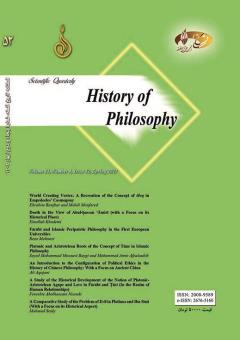-
-
List of Articles
-
Open Access Article
1 - Editor's Note
Hossein Kalbasi Ashtari -
Open Access Article
2 - World Creating Vortex: A Recreation of the Concept of δίνղ in Empedocles’ Cosmogony
Ebrahim Ranjbar Mehdi Monfared -
Open Access Article
3 - Death in the View of Abul-ḥassan ‘Āmirī (with a Focus on its Historical Place)
Einullah Khademi -
Open Access Article
4 - Fārābī and Islamic Peripatetic Philosophy in the First European Universities
Reza Mahoozi -
Open Access Article
5 - Platonic and Aristotelean Roots of the Concept of Time in Islamic Philosophy
Seyed Mohammad Moosavi Baygi Mohammad Amin Afzalzadeh -
Open Access Article
6 - An Introduction to the Configuration of Political Ethics in the History of Chinese Philosophy: With a Focus on Ancient China
Ali Aqajani -
Open Access Article
7 - A Study of the Historical Development of the Notion of Platonic-Aristotelean Agape and Love in Fārābī and Ṭūsī (In the Realm of Human Relationships)
Fereshteh Abolhassani Niaraki -
Open Access Article
8 - A Comparative Study of the Problem of Evil in Plotinus and Ibn Sīnā (With a Focus on its Historical Aspect)
Mahmud Seidy
-
The rights to this website are owned by the Raimag Press Management System.
Copyright © 2017-2026







